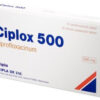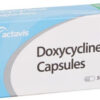Overview of Erythromycin
Erythromycin is a macrolide antibiotic, primarily utilized for treating various bacterial infections. It functions by preventing bacteria from synthesizing essential proteins, effectively halting their growth. Available in several forms, including tablets, capsules, and topical applications, its therapeutic applications are diverse. Prescribers opt for this medication when patients exhibit allergies to penicillin-based treatments.
Indications for Use
The medication is indicated for pneumonia, pertussis, and skin infections. It also treats respiratory tract infections such as bronchitis. Erythromycin is used to treat and prevent bacterial endocarditis and rheumatic fever in specific scenarios. There’s an option for use in cases of syphilis, diphtheria, and chlamydia, particularly in individuals with penicillin allergies.
Administration Guidelines
Erythromycin should be taken exactly as prescribed. Patients are advised to adhere strictly to dosing instructions. The frequency depends on the specific condition being treated. It’s often consumed on an empty stomach, usually 1 hour before or 2 hours after meals. The extended-release form must not be crushed or chewed. Avoid altering doses without consulting healthcare professionals.
Mechanism of Action
Erythromycin exerts its effect by binding to the 50S subunit of the bacterial ribosome. This binding inhibits protein synthesis by blocking the translocation of peptides. This process disrupts the bacterial cell’s ability to grow and replicate. It exhibits a bacteriostatic effect, depending on the organism and the concentration of the drug.
Pharmacokinetic Properties
Pharmacokinetically, erythromycin shows variability in absorption. It is absorbed in the gastrointestinal tract but has erratic bioavailability. The drug is extensively metabolized in the liver, undergoing demethylation. Erythromycin exhibits a variable half-life, often around 1.5 to 2 hours. It is primarily excreted in the bile and to a lesser extent in urine.
Potential Drug Interactions
The antibiotic may interact with specific medications like warfarin, increasing bleeding risks. Simultaneous use with statins amplifies the likelihood of myopathy and rhabdomyolysis. Erythromycin influences the metabolism of carbamazepine, prolonging its effects. Caution is advisable when co-administered with anticoagulants or anticonvulsants due to altered drug plasma levels.
Adverse Effects Profile
Common side effects include gastrointestinal disturbances such as nausea and abdominal pain. Some patients experience diarrhea and loss of appetite. Hepatotoxicity and allergic reactions, though rare, have been reported. Auditory dysfunction may occur, particularly in high-dose or prolonged therapy scenarios. Monitor patients for any unusual symptoms.
Considerations for Special Populations
Particular care is warranted in patients with hepatic impairment. Erythromycin’s metabolism occurs in the liver, so dosage adjustments might be necessary. For the elderly, monitor closely due to potentially altered pharmacokinetics. During pregnancy, consider the risk-benefit ratio, although current data suggests relative safety. Lactating mothers should consult healthcare providers as the drug is secreted in breast milk.
Patient Monitoring Parameters
Monitor liver function tests regularly, especially in long-term therapy. Be vigilant about any signs of C. difficile-associated diarrhea, a known complication. Assess for hearing changes in patients on prolonged high doses. Periodically check for therapeutic effectiveness and any adverse effects. Adjust therapy if required based on clinical response.
Storage and Stability Information
Store erythromycin at room temperature, away from excessive heat and moisture. Keep it in its original container with the lid tightly closed. Avoid exposing the medication to direct light. Ensure it is not accessible to children. Check expiration dates regularly to maintain efficacy. Dispose of any expired or unused medication properly.
Patient Counseling Points
Patients should complete the full course even if symptoms improve early. Inform them about the importance of adherence to dosing schedules. Advise about potential side effects and the importance of reporting any severe or unusual symptoms. Encourage them to stay hydrated and maintain a balanced diet during treatment. Alert them about avoiding grapefruit products, as they may affect drug metabolism.








Reviews
There are no reviews yet.